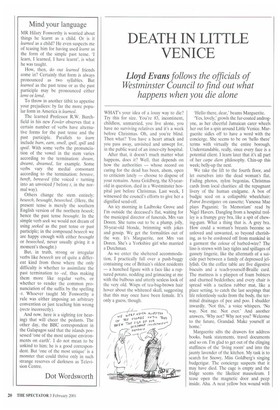Mind your language
MR Hilary Foxworthy is worried about things he learnt as a child. Or is it learned as a child? He even suspects me of teasing him for having used learnt as the form of the simple past tense. learn, I learned, I have learnt', is what he was taught.
How, then, do our learned friends come in? Certainly that form is always pronounced as two syllables. But learned as the past tense or as the past participle may be pronounced either lernt or lernd.
To throw in another titbit to appetise your prejudices: by far the more popular form in America is learned.
The learned Professor R.W. Burchfield in his new Fowler observes that a certain number of verbs have alternative forms for the past tense and the past participle. Parallels to learn include burn, earn, smell, spell, spill and spoil. With some verbs the pronunciation of the vowel in the stem varies according to the termination: dream, dreamt, dreamed, for example. Some verbs vary the medial consonant according to the termination: bereave, bereft, bereaved (the voiced v turning into an unvoiced f before t, in the normal way).
Others change the stem entirely: beseech, besought, beseeched. (Here, the present tense is merely the southern English version of the northern beseek; hence the past tense besought. In the simple verb seek we would not dream of using seeked as the past tense or past participle; in the compound beseech we are happy enough with either besought or beseeched, never usually giving it a moment's thought.) But, in truth, strong or irregular verbs like beseech are of quite a different kind from those where the only difficulty is whether to assimilate the past termination to -ed, thus making them more like regular verbs, or whether to render the common pronunciation of the suffix by the spelling -t. Whoever taught Mr Foxworthy a rule was either imposing an arbitrary convention or just teaching him wrong (recte incorrectly).
And now, here is a sighting (or hearing) that will cheer the pedants. The other day, the BBC correspondent in the Galapagos said that the islands possessed 'one of the most unique environments on earth'. I do not mean to be unkind to him; he is a good correspondent. But 'one of the most unique' is a monster that could thrive only in such strange reserves of darkness as Television Centre.
Dot Wordsworth


























































 Previous page
Previous page